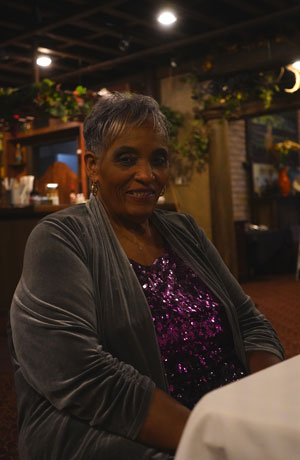Looking through the hour-glass of time, few artists manage to weave the threads of history, activism, and artistry as seamlessly as Sharon Manuel. With her single, “The Negro Speaks of Rivers,” Manuel offers not just a song but a deeply resonant narrative—a powerful continuation of her lifelong dedication to both her craft and the ongoing struggle for civil rights. This work is a culmination of a journey that began in her childhood, steeped in the rich cultural legacy of spirituals and the transformative power of music.
Sharon Manuel’s musical voyage is one that has been inextricably linked to her passion for social justice. From the tender age of childhood, where the piano keys became the first stepping stones in her journey, to her powerful voice becoming a beacon of hope in tumultuous times, Manuel’s career has been marked by a profound commitment to using music as a force for change. She grew up in a household where music was not just a form of entertainment but a vessel for spiritual and cultural expression, her sisters Cheryl and La Vergne, became torchbearers of the spirituals tradition in the Bay Area. Their performances at churches, radio stations, and private events throughout the 1950s and 1960s laid the foundation for a lifelong pursuit of musical excellence and social activism.

A significant catalyst in Sharon Manuel’s musical development was the mentorship of Mr. Eaton during her high school years. His influence ignited a passion for singing that would carry Sharon and her sisters through the turbulent 1960s—a decade where music was inseparably intertwined with the fight for civil rights. Manuel’s involvement with the Student Nonviolent Coordinating Committee (SNCC) during her college years placed her alongside some of the most prominent figures in the civil rights movement, including Martin Luther King Jr., Coretta Scott King, Malcolm X, and Stokely Carmichael. In these pivotal moments, her voice became an instrument of both protest and peace, a clarion call for justice and equality.
The crucible of the 1960s did more than just fuel Sharon Manuel’s activism; it honed her musical abilities, turning her voice into a vessel of emotive power and social conscience. Her dual commitment to music and social change led her to become a revered music teacher and the lead singer at Trinity United Methodist Church, where her performances were not just acts of worship but powerful expressions of hope and empowerment for her community.
The 1980s marked a significant chapter in Sharon Manuel’s narrative when she, alongside Gregory Hickman-Williams, took up the mantle of advocating for greater recognition of Black composers in the classical music sphere. This was a time when the contributions of Black musicians were largely overlooked, and Manuel’s efforts, supported by figures like Emmy Award winner Ben Williams, were crucial in shining a light on the rich legacy of Black artistry within this genre. Their work opened doors that had long been closed to Black musicians, paving the way for a more inclusive and representative classical music landscape.
Fast forward to the present day, and Sharon Manuel’s recent resurgence is epitomized by the release of “The Negro Speaks of Rivers,” a single that stands as a testament to her enduring dedication to music and social consciousness. This release is more than just a song; it is a profound reflection on heritage, resilience, and the enduring spirit of Black identity. The historical significance of her recorded performance alongside Gregory Hickman-Williams, Charlotte Nelson, and Cody Gillette in “Blacks Making History Today” in 1983, which remained largely obscured until its recent unveiling, is a powerful reminder of the timeless relevance of her work.
“The Negro Speaks of Rivers,” based on Langston Hughes’ iconic poem, is a masterclass in musical interpretation. Hughes’ poem, rich with lyrical finesse, traces the ancestral lineage of a Black man, connecting his existence to the monumental rivers that have shaped his people’s history. Manuel’s rendition of this masterpiece is a tapestry of haunting resonance, with her vocals imbuing the verses with an eloquent profundity that mirrors the poem’s essence.

From the very first lines, where Hughes proclaims, “I’ve known rivers ancient as the world and older than the mountains,” Sharon Manuel evokes a sense of deep-rooted belonging, a connection to a lineage that traces back to Africa’s flowing veins. As the poem invokes specific rivers—the Nile, Congo, and Euphrates—Manuel’s rendition captures the multifaceted roles these rivers have played in African history, culture, and spirituality. Her performance echoes the significance of these rivers as vessels of transportation, sources of life, and reservoirs of spiritual sustenance for generations of Africans.
Amidst the poetic descriptions lies a poignant reflection on the endurance and resilience of the Black experience, encapsulated in lines like “I bathed in the Euphrates when dawns were young.” These words, underpinned by Manuel’s emotive delivery, etch a portrait of beauty and fortitude amid adversity. The poem culminates with the powerful declaration: “My soul has grown deep like the rivers.” In this, the narrator’s identity intertwines with the unyielding strength of the African rivers, embodying a spirit unbroken by the trials of time.
In Sharon Manuel’s interpretation, every note, every intonation, is a deliberate homage to the poem’s essence. Her performance captures the depth, emotional resonance, and unwavering belief that define the poem’s themes of heritage and resilience. Manuel’s profound engagement with the material resonates deeply, magnifying the significance of Hughes’s powerful work.
Sharon Manuel’s recognition, including her acceptance of the MY MUSIC BLOCK TV AWARD, is a testament to her lifelong commitment to music and social consciousness. This accolade, along with her acceptance of the award on behalf of Gregory Hickman-Williams, highlights her deep-seated dedication to acknowledging and honoring the contributions of her colleagues and peers.
In celebrating Sharon Manuel’s illustrious career and her single, “The Negro Speaks of Rivers,” we are reminded of the profound impact music can have as a vehicle for social change. Sharon’s voice, a beacon of hope and empowerment, continues to inspire and uplift, resonating with the timeless themes of resilience and heritage that have defined her remarkable journey. As we listen to her interpretation of Hughes’s poem, we are invited to reflect on the enduring power of the human spirit and the rich cultural legacy that Sharon Manuel so beautifully represents.
OFFICIAL LINKS: SPOTIFY – WEBSITE











More Stories
Jo Page – ‘When We Knew Nothing’: A Sunlit Anthem of Innocence and Reckless Joy
Big Caz Ignites Loyalty and Reckoning with “You Ain’t My Brother (Remix)” ft. Taase & Harley G
Downtown Royalty Turn Up the Heat on “Homemade Bad” with Grit, Groove, and Guts